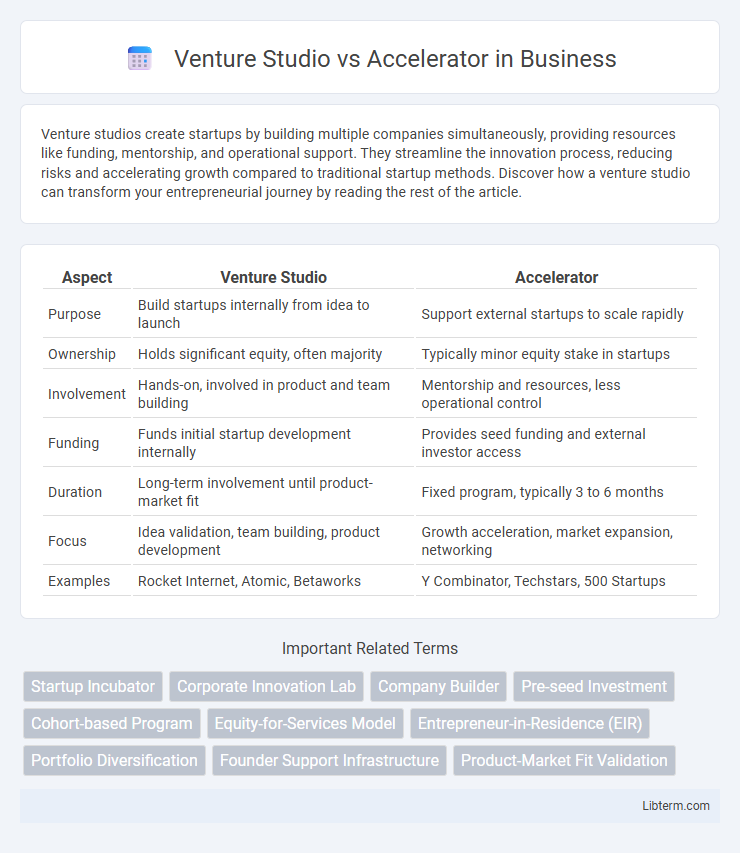Venture studios create startups by building multiple companies simultaneously, providing resources like funding, mentorship, and operational support. They streamline the innovation process, reducing risks and accelerating growth compared to traditional startup methods. Discover how a venture studio can transform your entrepreneurial journey by reading the rest of the article.
Table of Comparison
| Aspect | Venture Studio | Accelerator |
|---|---|---|
| Purpose | Build startups internally from idea to launch | Support external startups to scale rapidly |
| Ownership | Holds significant equity, often majority | Typically minor equity stake in startups |
| Involvement | Hands-on, involved in product and team building | Mentorship and resources, less operational control |
| Funding | Funds initial startup development internally | Provides seed funding and external investor access |
| Duration | Long-term involvement until product-market fit | Fixed program, typically 3 to 6 months |
| Focus | Idea validation, team building, product development | Growth acceleration, market expansion, networking |
| Examples | Rocket Internet, Atomic, Betaworks | Y Combinator, Techstars, 500 Startups |
Understanding Venture Studios and Accelerators
Venture studios are organizations that build startups from the ground up by providing funding, resources, and operational support, often taking an active role in company creation and management. Accelerators, on the other hand, offer time-limited programs that provide mentorship, seed funding, and networking opportunities to early-stage startups to accelerate their growth. Understanding the distinction lies in venture studios' focus on creating and owning startups internally versus accelerators' role in nurturing external startups through a structured, cohort-based curriculum.
Core Differences Between Venture Studios and Accelerators
Venture studios create startups by providing in-house resources, strategic guidance, and funding from the ground up, whereas accelerators primarily support existing startups through mentorship, networking, and seed investment during fixed-term programs. Venture studios actively build and validate business ideas internally before launching, while accelerators focus on scaling early-stage companies already in operation. The difference lies in venture studios' hands-on role in startup creation versus accelerators' role in growth facilitation.
How Venture Studios Operate
Venture studios operate by building startups from the ground up, providing internal teams with resources, funding, and strategic guidance throughout the entire product development cycle. Unlike accelerators that offer short-term mentorship and capital to existing startups, venture studios actively participate in ideation, market validation, and scaling, maintaining equity stakes in multiple portfolio companies. This hands-on, integrated approach enables studios to reduce risk and accelerate growth by aligning operational expertise with continuous innovation.
How Accelerators Support Startups
Accelerators support startups by providing intensive mentorship, seed funding, and access to a broad network of investors and industry experts during a fixed-term program, typically lasting three to six months. These programs emphasize rapid growth and market validation through structured workshops, pitch events, and demo days that prepare startups for subsequent funding rounds. By focusing on scaling existing ideas, accelerators help startups refine business models, improve product-market fit, and increase their chances of securing venture capital.
Funding Models: Venture Studios vs Accelerators
Venture studios fundamentally differ from accelerators in their funding models by providing internal capital to create and develop startups from inception, retaining significant equity stakes in these ventures. Accelerators typically offer smaller seed funding in exchange for equity during a fixed-term program, focusing on scaling existing startups rather than building them from scratch. This results in venture studios having a hands-on role with higher upfront investment, while accelerators act more as external growth catalysts with limited financial commitment.
Startup Selection and Admission Processes
Venture studios typically generate and develop startup ideas internally, selecting founders or teams through a controlled, often invitation-only process focused on alignment with their strategic goals. Accelerators open applications to a broader pool of external startups, using competitive selection criteria such as product-market fit, team potential, and scalability. The admission process in accelerators is time-bound and cohort-based, emphasizing rapid growth and mentorship, whereas venture studios provide ongoing, hands-on support with integrated resources from the inception stage.
Equity Structures and Ownership Implications
Venture studios typically maintain majority equity ownership in startups they create, enabling deeper control and strategic influence over business direction and resource allocation. Accelerators often take a smaller equity stake, usually between 5% and 10%, in exchange for cohort-based mentorship and access to capital, leaving founders with greater ownership and autonomy. Understanding these equity structures is crucial for founders to weigh long-term ownership dilution against the level of support and resources provided by each model.
Support, Resources, and Networking Opportunities
Venture studios provide comprehensive support by co-creating startups, offering in-house expertise, and sharing resources such as development teams and operational infrastructure, which accelerators typically do not. Accelerators focus on time-limited programs delivering mentorship, seed funding, and networking opportunities with investors and industry leaders to rapidly scale existing startups. Networking in venture studios tends to be more integrated and ongoing, while accelerators emphasize intense, cohort-based community engagement during the program duration.
Success Metrics and Outcomes
Venture studios emphasize building startups internally, measuring success through equity ownership, product-market fit, and long-term valuation growth. Accelerators focus on speed and mentorship, with success metrics centered on fundraising milestones, cohort graduation rates, and startup scaling outcomes. Both models aim to increase startup success, but venture studios prioritize deep involvement and sustained development, while accelerators optimize rapid growth and external investor readiness.
Choosing the Right Model for Your Startup
Selecting between a venture studio and an accelerator depends on your startup's development stage and resource needs. Venture studios offer hands-on co-creation, providing operational support, funding, and long-term involvement tailored for early-stage ideas. Accelerators focus on rapid growth through fixed-term mentorship, networking, and seed investment, best suited for startups ready to scale quickly.
Venture Studio Infographic

 libterm.com
libterm.com